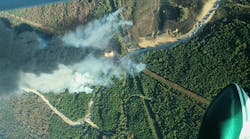One Worker Dead, Five Injured When the Colonial Pipeline in Rural Alabama Explodes
Fires are still burning at the site of a gasoline pipeline explosion in Alabama on Oct. 31. A crew of contractors from L. E. Bell Construction was working on the Colonial Pipeline line in Shelby County around 3 p.m. when their equipment struck the line, causing the explosion. One worker was killed and five others were injured, four with serious burns.
In a statement released Oct. 31, Colonial Pipeline said the contractors, who were hired to drain the line, "experienced an incident when the trackhoe it was using hit the line. Gasoline was ignited and caused a fire, which continues to burn.” The company has shut down the two tandem lines – one gasoline and one diesel – that traverse the area.
“Our deepest condolences go out tonight to the family and friends of the person who was lost today, and our thoughts and prayers are with those who were injured," the company said.
Working EPA, the Alabama Department of Environmental Management (ADEM) and the Cahaba Riverkeeper, Colonial Pipeline began water quality sampling began on Sept. 9 and will continue throughout the remediation process and periodically thereafter in consultation with ADEM. In order to maintain safe working conditions, an air monitoring plan also was put into place during the active response.
On Sept. 21, Colonial Pipeline completed construction of a temporary bypass around the leak site to allow Line 1 to return to service. This plan was reviewed by the U.S. Department of Transportation (PHMSA) and EPA.
In coordination with PHMSA, on Sept. 29, Colonial Pipeline identified the release location following excavation of the pipe. On Oct. 1, Colonial Pipeline removed the impacted segment of pipe and sent it to an independent laboratory for analysis.
In a statement released earlier this month, Colonial Pipeline noted its system currently was operating at normal capacity, adding, “Between late October and mid-November, Colonial will be performing system integrity work to remove the temporary bypass in Alabama and restore Line 1 to service.”

